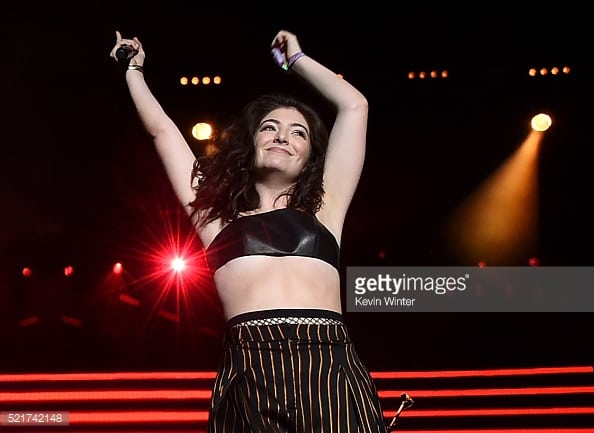We’ve all been waiting for it, and now it’s here: new music from Lorde. The artist behind “Royals” and “Team” is back, and her return comes with a dramatic shift in sub-genre and theme. Melodrama is the name of the fresh album, with tracks “Green Light” and “Liability” released so far. If “Royals” once provided a craftily poetic yet affectively stoic commentary on the enthralment of fame, Melodrama now serves as a counterbalance, issuing a riveting and intimate expressionism that moves listeners through an honest mix of triumph and tears. It’s quite the transition. Let’s break down what’s happened.
every time i see “@Pontifex” i think it’s some super hyped new metal band or something
— Lorde (@lorde) September 25, 2015
“Royals”1 was part of Lorde’s first album Pure Heroine, the opus of a teenager on the edge of glory.2 She openly shuns the superficial materialism and petty Darwinism of popular culture even as she catapults into it. “We’ll never be royals,” she sings with blissful conviction, hinting at her stage name’s play on a fascination with lords, kings, and princesses. Her pre-album peasant status relegates her to living out her royal “fantasy” by seeking “a different kind of buzz.” She finds this alt-high in the pure zenith of life with ordinary friends who travel to parties by public “train,” the transport of the hoi polloi. Other VIPs roll up to the club in pristine Corvettes and stretch limos while Lorde and crew laughingly stumble off the subway. The irony is evident, for soon her career will propel her into the exclusive “love club” of the world’s finest musicians. Singing, “Glory and gore go hand in hand,” she wonders how she will leave the barbarous Coliseum of celebrity with her integrity unscathed.
“Royals” and “Team” were the hits of Pure Heroine3 that first shot4 Lorde into the arena, but true innovation came in the clashing agitation of “Glory and Gore” and the surreal euphoria of “Love Club,” two other standouts from the album. Similar to “Royals” in lyrical content, “Glory and Gore” is a cold, sarcastic critique of high society. Back-up singers crown an assortment of lines with under-the-breath raps against hollow revelry. It’s dark and intense, morbid and frigid. By the third set of verses, the instrumentation breaks apart, and a pitted dud of mis-struck percussion emphatically builds the ambience of uneasiness. Casually, in the midst of this chaos, the singer’s persona asserts, “I don’t ever think about death.” Fame gives the illusive impression of immortality. It creates a distance from what is real. Though many revel as if they were to never die, the sarcasm of “Glory and Gore” tells us Lorde understands “it’s not forever.”5
YOUR GIRL ON THE COVER OF A PRETTY UNDERGROUND PUBLICATION KNOWN AS @vogueaustralia pic.twitter.com/hDDdVKYclb
— Lorde (@lorde) June 6, 2015
After a couple-year hiatus (apart from some smaller projects), Lorde has returned to take a second look inside. Now, instead of treating the sweet disease of fame, she has turned to examine the fresh wounds of jaded love and tattered friendships.
In “Green Light,” the first release from Melodrama, Lorde’s voice has the same scratchy rawness and youthful intensity, but the tune is much more danceable than anything on Pure Heroine. Shockingly, the track opens with a somber piano coupled with an equally sombre lyric: “I do my makeup in somebody else’s car.” She is disillusioned, embittered. It all sounds so depressing, but it doesn’t stay so for very long. The beat picks up, the score diversifies, and Lorde lifts herself from the asheap of heartbrokenness. The static ballad transforms into a dynamic dance against despair.
The music video is an incarnation of this inner dynamism. The camera initially confronts an image of Lorde’s face. She looks older, and her features betray a sense of anguish. As if holding back a wince, her eyes close for several seconds. It’s emotionally hard to watch. Soon, however, piano quickens, and Lorde emerges from her isolated state, walking confidently out into the street. The walls of her inconsolable emotions no longer enclose her. Pain remains, but she won’t be defined by it. Rather, she dances even as she throws an elaborately choreographed fit atop a black SUV. She basks in red fluorescence, a tribute to her recent past. The whole thing is rather theatrical, but there is a mysterious truth about it that cuts through the drama.
In a very candid interview with Zane Lowe of Apple’s Beats 1, Lorde claims that the song is the product of many months of processing what she “wanted to say next.”6 Green Light, therefore, is not a one-off but rather a crucial part of the coordinated statement she wishes to make with Melodrama. The album title and the track hint at what’s likely to come: a rollercoaster of emotions displayed in music that embraces the climactic rifts and drops of dance pop. However, instead of producing songs that match the market, Lorde hopes to remain “a bit of a weirdo.” She affirms, “I had to tell the truth….”
The song’s brilliance is its intricate and personal transformation. It evokes hope in a rise after a fall. The pain of a broken heart is real. Its unrelenting bite traps us. It feels like our despair is inescapable. We’re shattered to pieces, yet something somehow tells us that time heals. Tomorrow is only a day away. The best of us learn from our misfortunes while retaining confidence that our vulnerability won’t always leave us hurt. Such hope takes faith. To explain, Lorde gives us an interesting, down-to-earth analogy. The song is like the journey of a drunken fraternity girl. On night one of a breakup, she is an absolute mess. She’s bawling at a party. She’s inconsolable. However, when she wakes up the next morning (or afternoon), she starts to rebuild, even if she doesn’t notice it’s happening. What’s so convincing about the narrative of the song is its reality. Lorde has had this experience. It comes from her life.
it’s the first chapter of a story i’m gonna tell you, the story of the last 2 wild, fluorescent years of my life. this is where we begin
— Lorde (@lorde) March 1, 2017
Evidently, the betrayal of love is not the sole emotional experience that Lorde enshrines in the album. The second track release is “Liability,” a song so affectively penetrating that it has taken her somewhere “she had never been before.” It opens with the same slow piano, but now there is no pivot, no joyful transformation. As if in rebellion, she stays true to herself by prolonging her state of grief. Here we find the artist’s pure expression. The world tells her to be consoled, but she is inconsolable. The world tells her not to produce such a sad and bitter song, but she does anyways. In doing so, she unearths a social pressure that often goes unnoticed: the pressure to say, “I’m okay.” The song reveals a glimpse of the meaning of the album’s title. We’ve been taught to hide our vulnerability. We’ve been instructed to paper over our feelings. We’re asked to have “our s— together,” but what if it’s not? The moment we start to be “dramatic,” people run away. They say, “What a drama queen!” Confronted with such rejection, Lorde doubles down on her emotions. She reclaims the image of the drama queen. She reclaims melodrama because melodrama is the truth of her life, and we can’t hide from the truth of what we feel.
The truth! The world is tired of lies and virtual realities just as much as it is tired of celebrity culture’s “jet planes, islands, [and] tigers on a gold leash.” There is a restlessness for reality in Lorde’s music that speaks of humanity’s restlessness for true expression. Our hearts are moonlit theaters of war–battles pitting lies and comfort against truth and love. That’s why we like Lorde’s work. It is conflictive, like we are. It is melodramatic, like we are. Amidst the soulful sounds of the young idealist, Eros and Thanatos gladiate. An impulse to life struggles against an impulse to self-destruction. There is ecstasy, and there is withdrawal. The two fight each other. The battle springs from a divided and all-too-human heart, and I’m glad this sort of heart is on display in Melodrama.


